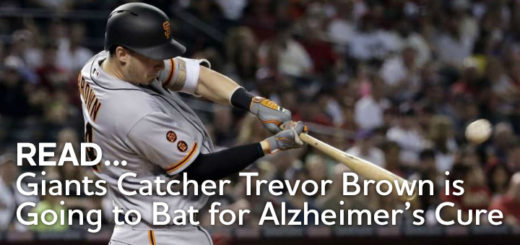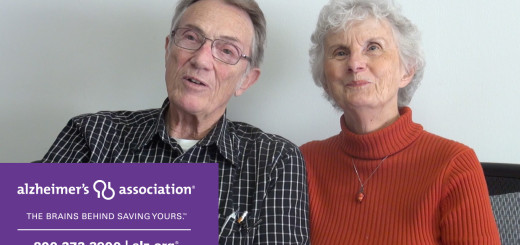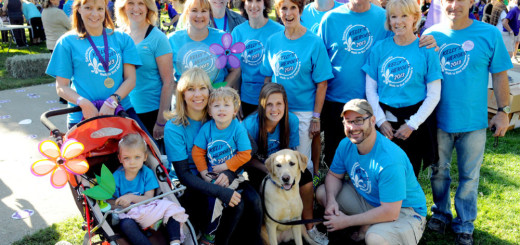Father’s younger-onset diagnosis inspires daughter to revisit her priorities
Bruce Pasternack, who is well known globally for his work as a managing partner in a prominent consulting firm, Bay Area venture capitalist and President and CEO of Special Olympics International, was diagnosed with younger-onset Alzheimer’s in 2013. His daughter, Joanne Pasternack, shares the man her father was, and how his diagnosis has led her to make changes.

From humble beginnings to working for the president
Bruce Pasternack was born in Brooklyn, New York in 1947. After graduating at the top of his class at Wingate High School in 1964, he earned a degree in Mechanical Engineering from The Cooper Union, followed by a Master of Science in Engineering from the University of Pennsylvania.
At age 26, when he was just a dissertation defense away from his PhD, Bruce joined President Gerald Ford’s staff at the White House, where he served as head of energy policy at the Federal Energy Administration and principle staff to the White House Energy Resources Council and the President’s Council on Environmental Quality. His work influenced environmental policy that is still in effect today.
Building his career and helping others
Bruce worked for a global consulting firm for 30 years, first in Washington, DC and later in San Francisco. He led the Energy, Chemicals and Pharmaceuticals Division, created the Strategic Leadership Practice Group, served as Managing Partner of the San Francisco office, was a Senior Vice President and authored two best-selling business books.
“Regardless of the accolades he received, my father always led with kindness and humility,” shared Joanne, the oldest of Bruce’s three children. “He never forgot his humble beginnings nor took his success for granted.
Bruce wanted to leave a legacy through philanthropy, and in 2005 he returned to Washington DC to serve as the President and CEO of Special Olympics, Inc. “It was the most rewarding role of his life,” shared Joanne. “He traveled the world advocating for people with intellectual disabilities through an organization focused on positivity through sports and possibility.
“My dad was always generous with his time and equally enthusiastic about problem solving with global political leaders, young tech CEOs and Nobel prize winners as he was with front line workers, Special Olympics athletes and movie stars. I just felt lucky to have him as my dad and to be able to learn from his incredible vision regularly.”
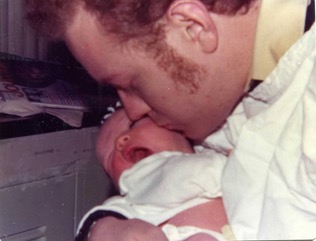
Going out of his way for his kids
Besides being a busy executive, Bruce was also a dedicated father. “From my earliest days, my father and I were very close,” said Joanne. “I always felt like my dad was there to protect me, to be my advocate and to help me navigate each stage of my life journey.”
Although his work was demanding and had him traveling frequently, Bruce made sure that his three children never felt like they came second to his job. “We knew his work was important and that it not only made businesses stronger but also provided us with a wonderful lifestyle,” said Joanne. “However, like most children, we also selfishly wanted him home for the big events. And – somehow – he found a way to always be there.
One specific instance of this was the father daughter dance at Joanne’s high school. “My dad had been on a business trip in Australia,” said Joanne. “He had a quick turnaround for a meeting in Chicago the next day.
“While I am sure he would have enjoyed a relaxing night at home, he went straight from the airport to home where he enthusiastically put on a goofy, thematically-appropriate outfit and energetically escorted my sister and me to the dance that evening.
“When the dance ended, he was on a redeye flight to Chicago. Baseball games, viola recitals, ice skating competitions – my dad was always there for us, insisting that there was “˜no such thing as jetlag’ – a statement I repeat to my kids today!”
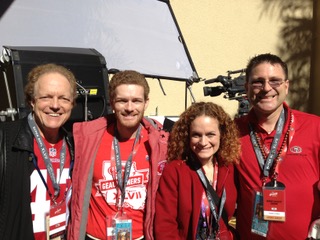
Super Bowl LVII
Joanne inherited her work ethic from her father. For nearly fifteen years, she has been an executive in the sports industry, holding roles as the Vice President of Philanthropy for the San Francisco 49ers and the Golden State Warriors and Executive Director of The Golden Heart Fund, along with serving on numerous charitable boards and raising two children of her own.
Joanne was working for the San Francisco 49ers when the team played in Super Bowl LVII in New Orleans in 2013. Joanne had the opportunity to bring three guests to the game. It was an easy decision – she invited her husband, her brother and her dad. “Not only are all three huge 49ers fans but they are also three of my strongest supporters and cheerleaders,” shared Joanne. “I couldn’t imagine being at Super Bowl without them.”
Acting differently
Bruce flew to New Orleans with friends and, when they landed, one of the men told Joanne that her dad had been acting in an unusual manner – repeating himself and being even goofier than was typical. The friend suggested Bruce may have had too much to drink but Joanne knew that would be out of character for her dad, a man who rarely drank alcohol and never over indulged.
At the time, Bruce had been given a diagnosis of mild cognitive impairment (which had not been shared with anyone outside of close family members), but this observation was concerning.
Over the next few days, Joanne and her brother, Dan, saw more and more evidence of odd behavior from their dad. “He couldn’t remember his room number and kept losing his phone or his room key,” said Joanne. “I brought him to events with prominent 49ers, people he had loved watching on TV in the 80s. He didn’t know who they were. He was agitated and confused, socially isolating and seemed extremely hesitant to be left alone.”
For a man who had traveled the world and who was known for his self-confidence, self-sufficiency, and aptitude, this was concerning. By the end of the week, Joanne, her siblings and her father’s wife, Lynne agreed – Bruce needed to see a specialist. This wasn’t just mild cognitive impairment and, whatever it was, it was advancing. Just a few months later Bruce received a diagnosis of younger-onset Alzheimer’s disease.
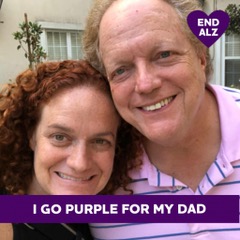
The challenges of younger-onset Alzheimer’s
Alzheimer’s disease is considered to be younger-onset if it affects a person under 65. People with younger-onset Alzheimer’s can be in the early, middle or late stage of the disease.
For Bruce’s family, one of the most challenging logistical elements of having a loved one with younger-onset Alzheimer’s has been finding an appropriate place for him to live when he could no longer live at home.
“He’s six feet tall, over 200 pounds and, outside of his dementia, a remarkably healthy 72-year-old man,” said Joanne. “It has been surprisingly difficult to find a place that will provide him with the social outlets, physical fitness opportunities and everything he still craves, while also meeting his needs as someone with Alzheimer’s.”
After a few missteps, Joanne and her family have found a home that is warm and meets his needs, but they have also come to the realization that there is no perfect solution, only the best solution for now.
Joanne, Lynne and their close-knit blended family know that they need to be an active and vocal advocate for Bruce and others with younger-onset Alzheimer’s. For Joanne, this is something else she learned from her father.
Standing up for her dad
It can be difficult when Joanne takes her dad on an outing. Physically, he looks even younger than his 72 years and you can’t necessarily tell by looking at an individual that they have dementia.
“We were at the mall a year ago and my dad suddenly forgot how to use an escalator,” said Joanne. “People were getting angry behind him, telling us to “˜hurry up’ and “˜move aside.’ I just stood there and said, “˜Folks be patient please.’ My daughter was with me and it scared her to see how aggressive people were towards her beloved papa.
“I had to be strong for my dad and my daughter, but when I got back to the car I cried. Where were these people off to in such a hurry? Couldn’t they see my father was in distress? Patience. Kindness. Empathy. It reminded me of the quote – “˜Everyone you meet is fighting a battle you know nothing about.'”
Joanne encourages caregivers to carry around a courtesy card in their wallet that says, “Please be kind, my companion has dementia. I first found this card at the San Francisco Walk to End Alzheimer’s,” said Joanne. “The world isn’t always patient, and it’s harder when you have a hidden ailment or challenge.”
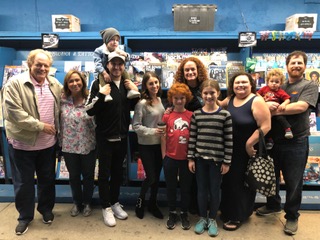
Changes to her board
Joanne sees her circle of colleagues, friends and family similar to members of a personal Board of Directors. As her Dad’s disease progresses, she is quickly learning how many “seats” on her “board” he was filling and how hard it is to find others to fill those roles.
“It isn’t difficult find someone who will help you with something when times are tough or to find subject matter experts to ask for advice,” said Joanne. “But I have found that it’s much harder to find someone who can align their advice with my specific needs.
“My dad was open and honest with me and knew me better than I knew myself. He didn’t tell me what to do but he knew how to guide me towards the best decisions.
“But what do I miss the most now that my father can no longer communicate nor recognize me? In Yiddish, there is a word that I love – kvell. It roughly translates to being “˜extraordinarily proud, delighted and jubilant’ about someone’s success or achievements. My dad was always kvelling about me – he was my biggest cheerleader.
“He was the first person I would call with good news because he would celebrate it with a joy that was unparalleled. I often think about a comment he made to my boss [the owner of the 49ers, John York] at an event many years ago. He said, “˜John – isn’t it something to be known as Jed’s dad? I can’t believe I have the chance to be known as Joanne’s father and can only imagine how proud you are to be Jed’s dad.”
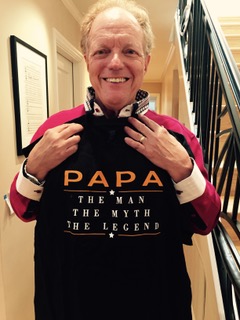
A visit to see her father
When her father was diagnosed in 2013, Joanne was working over 80 hours a week. Her body was falling apart, she wasn’t sleeping well, and she felt stretched so thin she was on the brink of collapsing. Over five years later, despite doctor recommendations, she still hadn’t slowed down. It wasn’t until a jarring visit with her father that she finally realized she needed to make a significant change in her life – it was time once again to follow her dad’s lead.
“A performer was playing my dad’s favorite song during his visit to my dad’s care facility in Los Angeles,” said Joanne. “Despite the fact that my dad now needed help with nearly all activities and was no longer able to recognize loved ones (including me), he was holding my hand tightly and singing along to the very same song we had danced to at my wedding – Elvis Presley’s “˜Can’t Help Falling in Love.’
“It was getting late and I needed to catch my flight to Oakland so I could get to my job that evening at the Golden State Warriors game. I dropped my dad’s hand, kissed the top of his head and quickly ran out.
“I flew to Oakland, changed in the car, and went to the Warriors game. As I was running around doing my job, I had an epiphany. I asked myself, “˜What am I doing?’ and I thought back to earlier that day with my dad. I realized that he would never have let go of my hand for something work-related.
“He had built an incredible career, made a huge impact on the world, helped vulnerable populations and provided for his family while still standing by my side when I broke my wrist ice skating or received an award in high school.”
Modifying her own lifestyle
Joanne realized that she had been trying to do everything her father had done and, in the process, was potentially causing long-lasting damage to her physical well-being. In her efforts to achieve as much – or more – as her father professionally and personally, Joanne was losing her perspective on what was truly most important – being strong, healthy and present for her family.
Traveling to Southern California to see her father regularly was difficult for Joanne. She wanted to be a better source of support to her father’s wife, who was Bruce’s primary caregiver. The stress, anxiety, and sense of guilt had become overwhelming.
That moment with her father spurred Joanne into action. It took some trial and error, but she was able to find the right balance between purpose-driven work and achievement and commitment to self and family.
She left her job at the Warriors in August 2018 and now serves as the Executive Director of The Golden Heart Fund – an organization dedicated to serving 49ers alumni who are in need of financial, medical, physiological or emotional support and bringing awareness to brain health and research.
She also launched a consulting firm where she works with professional athletes, legends, entertainers, philanthropists, corporate executives and high net worth individuals to amplify their impact to inspire change around their areas of passion, commitment and expertise.
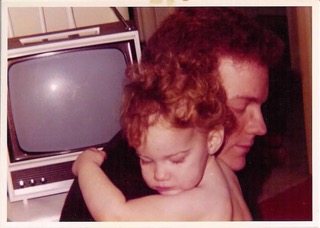
Living a better life to honor her father
Joanne now has a job she loves. She is able to make a difference, following her passion, use her talents and still have energy left at the end of the day to focus on the most important aspects of her life.
“The financial rewards aren’t as significant, but I was tired all the time,” said Joanne. “I was missing out on the simple, everyday moments with my kids and my husband. Life was passing by and my health and my family life were suffering.”
“If I know anything about Alzheimer’s disease,” said Joanne, “I know that taxing my body, not sleeping or exercising could potentially make me more vulnerable. My dad was under huge amounts of stress and was pushing his body to its limits for decades, believing that he would finally be able to reap the benefits of his hard work in his old age.
“I can’t change my dad’s journey and I can’t stop time. All I can do is enjoy the moments I have now and share my learnings with others so that they too can take a deep breath and decide if they are on a path that will lead them towards their best possible outcome.
“I have had a life filled with once in a lifetime moments and I am looking forward to a long and healthy future sharing those memories with those I love most in the world.”
For resources and information on people living with younger-onset Alzheimer’s, visit our Younger-onset page.
Learn more:





